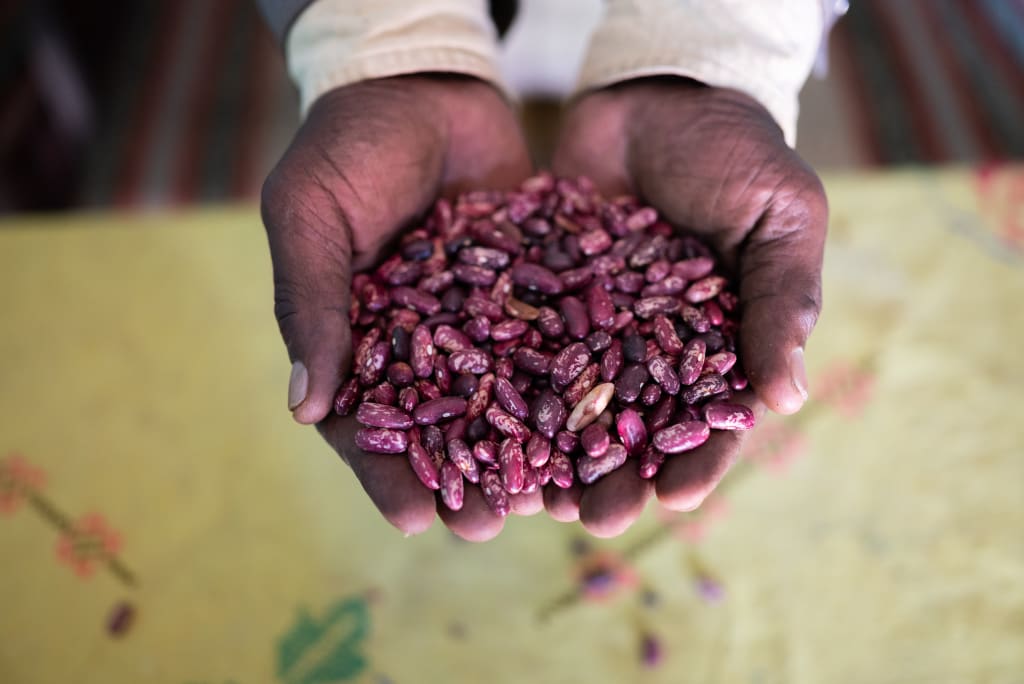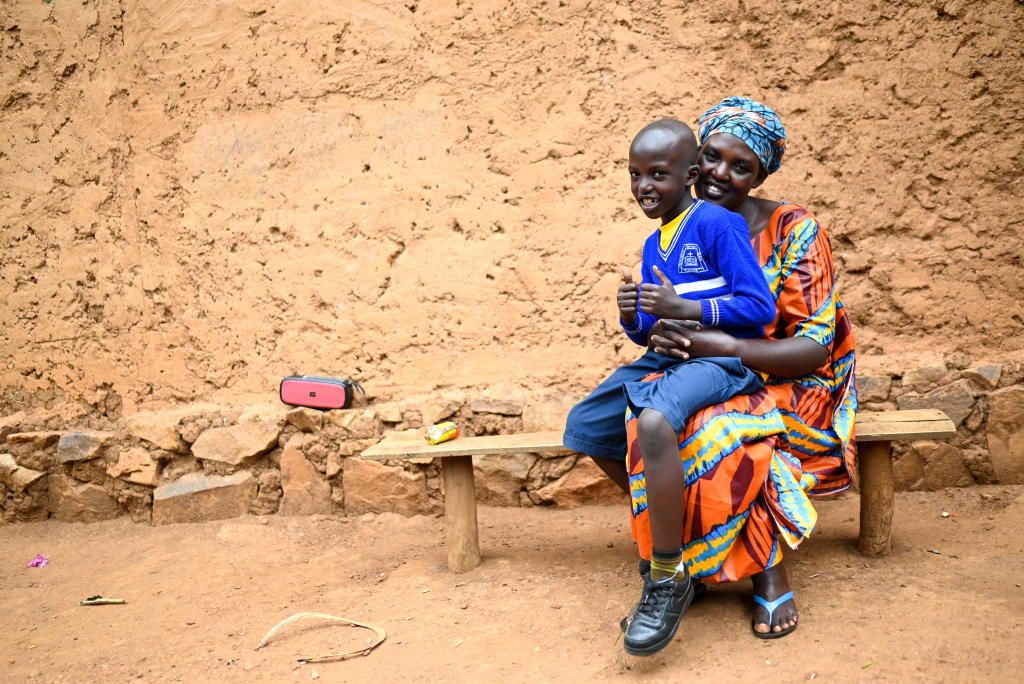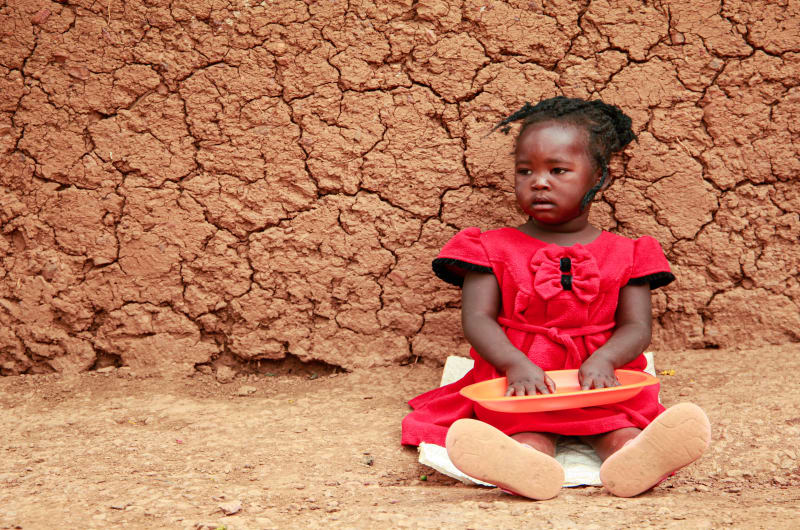Why is it that some people can survive a crisis and others struggle?
Why does a changing environment devastate some communities but go nearly unnoticed elsewhere?
The answer is simple.
Resilience.
A community resilient to crisis
When we talk about resiliency at Compassion—whether it is regarding food insecurity or another crisis— it isn’t the character trait of individual people that we’re talking about. Mere optimism about the future and self-confidence are not anywhere close to what’s needed.
Here’s what we mean: A community that is resilient to crisis is one that has the resources, relationships and experience necessary not to be overwhelmed by adversity and to change practices to face a changing world.
Imagine your local community has been able to produce what it needs for generations. Whatever the community doesn’t produce can be traded for with the next community over or can be purchased. The skills you have are the skills suited to this pattern of living. One day, things begin to change. These changes could be due to globalization, technology, environmental factors or political shifts. Suddenly the goods you need are no longer available, no one needs the product you craft, your job is eliminated or your income isn’t anywhere near enough.
Imagine traditional foods have suddenly become difficult to grow or buy. Families are splitting apart to look for work or go to school in different cities and your trusted friends are gone or in crisis themselves. Perhaps an illness sweeps across your nation, or there are wars and massive government changes. The solutions you are used to falling back on don’t work today.
You have a family to feed and don’t know where your next meal will come from.
What do you do? How do you recover?

What is Compassion doing to help families facing food insecurity?
In 2023, the World Food Programme estimates that 345 million people are facing acute food insecurity in 82 countries. We call this a global food crisis, and it is affecting children in every country where Compassion operates. Because the causes of this crisis are complex, the solutions aren’t easy.
But the plan is simple.
- Relief: With the help of donations from Canadians like you, we equip local churches to give immediate food assistance to struggling families to stop malnutrition and starvation. Read more about our relief efforts here.
- Resiliency: These same local churches use donations given to the Global Food Crisis fund to build long-term resiliency and restore access to nutritious food so children can thrive.
The keys to fighting food insecurity
Regardless of the complex causes that have led a community to experience a food crisis, we are seeing time and time again that the result is food insecurity. For families, this looks like not knowing whether vegetables or rice will be in the shop tomorrow, not knowing whether their crops will grow, and not having food in the pantry or money to buy more. This pattern leads to failing health and a sense of hopelessness.
Restoring the regular availability of nutritious food is one of the keys to winning the fight against this crisis.
Compassion equips families to increase their income so food can be purchased—even as prices continue to rise—and restores the ability for families to produce their own food. We empower local churches that know their communities and the people in them to apply solutions.
We want to introduce you to three things that Compassion provides in communities around the world to create resiliency and show you that the results are truly transformational!

1. Resilience requires change.
When the world around us is changing, a shift in our own mindset or practices is often required. Especially when trying to survive a crisis. It starts with asking the question, “If what we are doing isn’t working and our resources are limited, what can we do differently with the resources we have?”
This was the same question on the mind of Rizinia, a Compassion centre director in Ethiopia. He observed that most families in the community were having a difficult time providing food, and as a centre, their resources were continuously drained. With food prices rising, loss of local jobs and disruptions in food availability, the village was suffering.
Rizina believed that creating a culture of self-sufficiency could improve these conditions. He observed that the community relied on food grown elsewhere but couldn’t help but notice what was right before their eyes.
“The land in our area is extremely fertile but underutilized. We had several discussions and came up with the idea of using the empty church compound to grow food,” he says. “That is what we had at hand.” This allowed them to model for families how to use the resources they have in a new way to withstand the food crisis.
The food garden became a success as the parents came together to plow, plant and care for the seedlings. After the sale and distribution of the original crop, new seeds were purchased. Every family received seedlings to plant in their own yards. They encouraged families to leave no land empty and grow food everywhere they could. Any place the sun hit, they sowed the seed. Those without yards worked plots of land at the church.

“Now, using the small plot of land I have, I’m feeding my children,” one parent shares. “The centre has helped open our eyes and ignited something in us. Our hands are busy. We are happy to be fruitful in our own work!”
Moges, a Compassion participant says, “Thanks to the centre, we are free to eat whenever we want. We don’t worry about what tomorrow will be like. We have corn and red beans in our backyards. We even share with our neighbours.”
After the corn and beans came coffee, a wide range of vegetables and other foods. The change required the curiosity to ask the question, “What do I have in my own hands that I could use?” When families learned that what they had could help address the food crisis in their community, they went from reliant to resilient.
2. Resilience requires connections.
In order to respond to crises, people need resources. These resources might come in the form of financial savings, friends and family connections, personal experience or material goods. It is much easier to ask, “What do I have to solve this problem?” when you have a full cupboard and bank account. For those experiencing poverty already, food insecurity becomes a crisis very quickly.
This is where Compassion church partners can step in to provide a connection to the community, education and resources necessary for communities to build resilience.

For eleven-year-old Juna in Colombia, this connection came in the form of farm supplies. While her father worked long hours, his income was far from sufficient to provide food for the family. They were one of 50 families who received chickens, seeds and pigs along with training to start farming for food and income.
The Compassion centre director, Arnaldo, wanted to provide much more than food for hungry families. He wanted to help families generate an income and build knowledge to improve their quality of life for generations.

Juna loves helping to feed the animals and care for the plants. While she used to go to school without eating, she now grows eggplants, chilis, cucumbers, onions, plantains and passionfruit, along with eggs and meat.
Juna’s mother, Katerine, says, “Without the centre’s support, we could not have the farm. We can dream many things, but without the resources and knowledge they gave us, we wouldn’t accomplish our goals. Thanks to the centre and donor support, we can provide for our families and grow our businesses. I feel like an entrepreneur woman! This farm is a blessing for my family and community.”
Other families are experiencing the blessing of resource gifts, too. For 9-year-old Alis in Peru, food was difficult to grow because of the climate in the Andes mountains where she lives. Unexpected drought and freezing weather meant that crops were failing, and many went hungry. As the drought persisted and plants were dying, the local Compassion centre distributed food baskets, but it was obvious this was not a long-term solution.
Gathering the community parents together, centre staff announced that they would help families build greenhouses so that plants could be protected and yields increased. The centre provided training to build simple greenhouses, along with materials and seeds.

Despite the freezing cold temperatures, plants began to thrive. Alis says, “I am very happy to see seeds growing because it’s hard to get vegetables around here, and they’re good for me. My favourite is beets. It’s not hard to grow them. My mom learned first, and then she taught me. I know how to put fertilizer around the seeds, water them and adjust the blue plastic for our strawberries.”
Alis’s family sells some of the food to neighbours but also gifts some of their food. The greenhouse has allowed them to be generous and share their blessing while facing the food crisis with confidence.
Juna and Alis now know that with hope and connections to the right resources, a crisis can be overcome.

3. Resilience requires choices.
Creating a means of local food production isn’t the right fit for every situation. This is why Compassion centre staff look for the solutions that will best fit families involved. For some, simply helping to increase family income is enough to re-establish secure access to food.
To accomplish this, job skills training and gifts of basic equipment are offered to some Compassion-assisted families. The needs and opportunities in each community are assessed by Compassion staff to maximize success in generating income.
Gad is a seven-year-old Compassion participant who lives in Rwanda. His mom, Mbabazi, used to grow crops on a small plot of land to provide for her family. The lack of rain has meant she needed a new means of making money. Her local centre offered various training programs including shoemaking.

At first, she was hesitant. Traditionally, this trade was for men. However, curiosity and the need for regular work gave her the courage to seek training and make her first pair of shoes. For now, Mbabazi shares equipment with other shoemakers. Slowly, she is saving up to someday purchase her own.
As her skills have improved, she is expanding her work from sandals to making other leather products such as bags, belts and shoes. Even though she is the only woman shoemaker in her community, Mbabazi is proud of her new skills. The connections she has made with others in this trade have helped her to access a whole new set of choices when it comes to taking care of her family.

Esperance, a Compassion staff member in her village, says, “In our model of building capacities, we give centre stage to the art of the craft. This is how we offered training in shoemaking, and I’m happy that Mbabazi demystified perceptions that shoemaking is only for men. Through her, we are encouraging other mothers to get involved.”
In Ethiopia, another set of mothers and caregivers are learning to be financially self-sufficient in other ways. Aberash is one of 13 moms who have received training in pottery making. She had always wanted to contribute to the family income but didn’t have any means to do so. When she heard of an opportunity to learn to make pottery, she knew this was what she had been waiting for! She found the training demanding, but she was determined to be successful.

“I envisioned myself working and selling my products once I’m done with the training,” says Aberash. “I envisioned myself buying food and clothing for my children. I envisioned my husband’s relief as he returned home without his daily income to find I had taken care of expenses at home. All these gave me the energy to come every morning and be attentive.”
At the end of the training, Aberash was recognized as being at the top of the class and gifted a manual pottery wheel.
“It gives me great pleasure to see dreams materialize like this,” says centre director, Ferhiwot. “We are always thinking about ways to help caregivers become self-sufficient. Especially now when the food crisis hits every home hard, we know our food distribution can only last a while. I believe empowering mothers through skills training and income generating activities, so they can work and earn an income, can ease the burden.”
Compassion was able to provide Mbabazi, Aberash and other caregivers like them choices where they thought they had none. Because of their dedication, both have increased their family income and even begun to save money for future needs.

We know that in order to get through this crisis, a community of people is needed. Compassion is part of that community, and you can be too! You can help make change, connection and choices possible for families impacted by the global food crisis.
Give the gift of food resilience today.
Photos and field reporting by Tigist Gizachew (Ethiopia), Lina Marcele Alarcón Molina (Colombia), Fernando Sinacay (Peru) and Doreen Umutesi (Rwanda).





